Self-care is a well-recognized and important part of maintaining physical and mental wellness. It can be a form of preventative maintenance by helping to prevent feelings of burnout or fatigue. Self-care can be seen as an individualized process of tuning in and tending to the needs of your body, mind, and being.
This means that self-care may look different from person to person, and your personal self-care may also look different day-by-day. Tuning into your needs may first require giving yourself space to mindfully observe your current emotional state, and tending to your needs may mean finding a practice or habit that personally resonates with you. Self-care can be practiced at home, at work, and in the community.
On this page, we review the difference between self-care and self-soothing, share 5 types of self-care, and discuss how self-care relates to suicide prevention.
Self-Care and Self-Soothing
You may often see activities promoted as self-care such as taking a bubble bath, going for a walk, or eating a special meal. While those activities can help someone feel better when they are struggling, they might be better understood as self-soothing activities, rather than self-care. Self-care refers to the things you can do as part of your regular routine, that are longer-term ways of managing stress or mental health difficulties. Self-soothing, on the other hand, are activities or techniques that we use to provide more immediate relief after a stressful experience.

Types of Self-Care
There are many models or frameworks for self-care that may contain different categories or types. Some models of self-care are framed to support someone’s overall health, whereas other models are more focused on self-care and mental health specifically. As such, the categories of self-care that are discussed below are just one way to understand self-care.
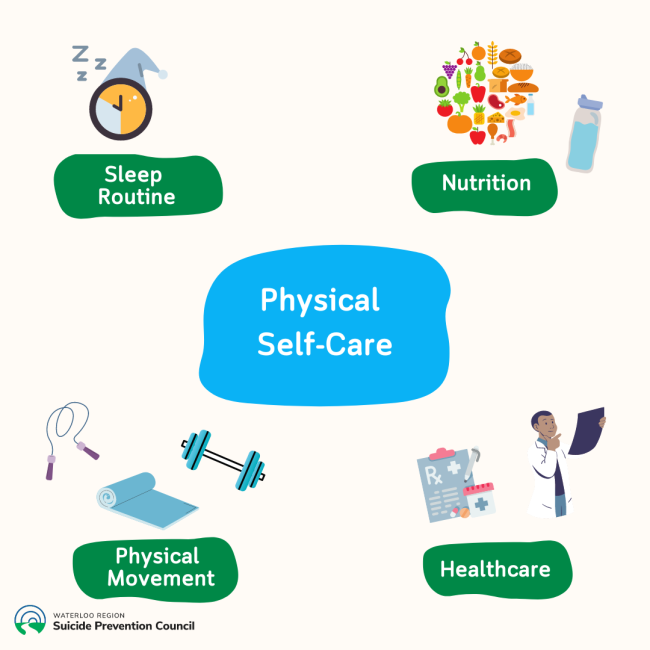
Physical Self-Care
Physical self-care is likely the type of self-care that you are most familiar with which focuses on taking care of your physical health and wellbeing. It includes many of the building blocks to a healthy lifestyle: sleep, physical activity, exercise, and nutrition. Attending healthcare appointments and taking medications as prescribed can also be examples of physical self-care.
- What aspects of your physical health do you prioritize, and which aspects may get neglected?
- What aspects of physical self-care will you aim to focus more on this week?
Mental Self-Care
Mental self-care involves your thoughts or inner dialogue, how you keep your mind engaged, and how you may pursue mental wellness. It can include participating in hobbies that you enjoy (whether or not you are ‘good’ at them), developing your personal identity, and having a strong sense of self.
- What are the things that you love about yourself?
- How can you nurture your mind on a regular basis?
- What proactive things do you do to help you stay mentally healthy?
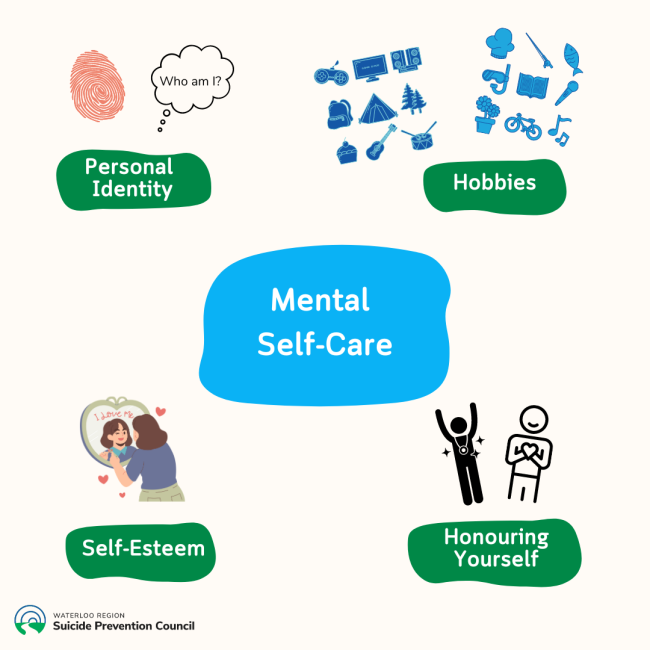
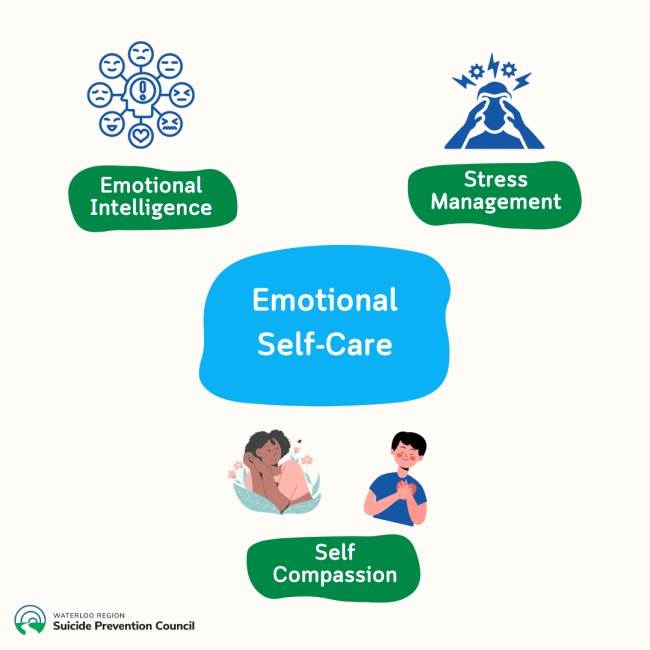
Emotional Self-Care
Emotional self-care may seem similar to mental self-care, but rather than incorporating mental wellness as a whole, emotional self-care involves how you may recognize and manage your emotions. It includes the activities you do to help you acknowledge and express your feelings regularly and safely. Not everyone will have the same skills to identify and cope with their emotions, but like the other forms of self-care, emotional self-care skills can be developed over time.
You may talk to a partner, close friend, or health practitioner to process your emotions, or you may adopt a practice to help you do so, such as journaling or meditative walking.
- How do you identify and communicate your emotions?
- How do you manage your strong emotions?
Spiritual Self-Care
Often times spirituality is understood as belonging to a religion or faith. Religion may be an important part of some people’s spirituality, but it is not for everyone. Spirituality then, is not necessarily religion, but reflects the meaning and purpose you may feel in life, and your sense of being connected to something larger than yourself (such as the universe, nature, or a higher power).
- Do you feel a sense of meaning or purpose in your life?
- Are you engaging in spiritual practices that you find fulfilling?
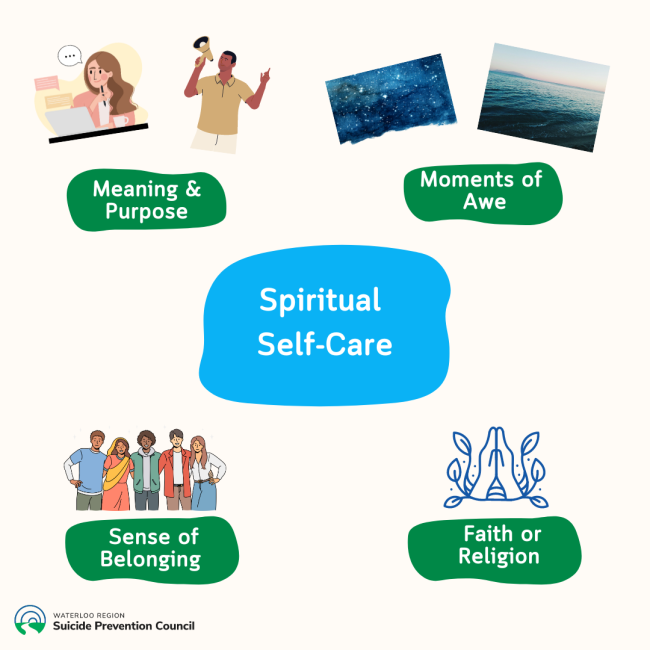
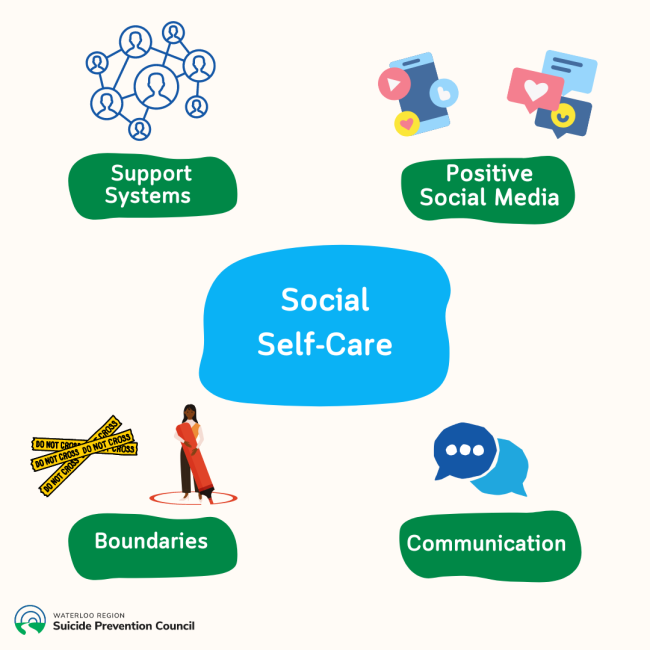
Social Self-Care
Humans are social creatures, and having positive relationships with others can help us to feel mentally and physically well. Social self-care includes the relationships and close connections we have with others and involves finding the right balance of social activity for you. Developing healthy boundaries with others is also an important part of social self-care and can include saying no to events after a long day, limiting interactions with negative people in your life, or having particular people you go to for certain things.
- What amount of social connection do you think you require to feel fulfilled?
- Who are the people in your life that you can turn to for support?
- How are you ensuring your social needs are met while also respecting and maintaining your boundaries?
Self-Care and Suicide Prevention
Self-care may be a meaningful part of suicide prevention by supporting a person’s resilience and ability to manage challenging experiences. Aspects of self-care are also found in the protective factors for suicide. For example, mental self-care involves self-esteem and sense of self, and having good self-esteem or strong sense of self can be a protective factor. In general, people may notice that they are better able to manage stress, challenging situations, or difficult emotions when they are eating well, sleeping enough, and socializing with others regularly.
In addition, some aspects of self-care may make it easier to seek help. Having strong relationships with others, for example, may mean that you have someone in your life you can turn to for support. Or, developing skills to identify and communicate emotions as part of emotional self-care may make it easier for you to share how you are feeling with someone who can help.
It is important to recognize that effective suicide prevention not only involves the work of individuals, but also require engagement from communities, government, and other stakeholders, in prevention efforts such as education campaigns, providing suicide alertness and intervention trainings, and increasing access to culturally competent mental health care to complement the work.
If you are interested in learning more about self-care, you can check out the references for this blog post, as well as additional resources for further learning below.
References & Resources for Further Learning
5 Self-Care Practices for Every Area of Your Life (verywellmind.com)
This article explains the different types of self-care and their importance. It also includes some tips for how you can develop a self-care plan.
The Seven Pillars of Self-Care – ISF (isfglobal.org)
The International Self-Care Foundation provides a broader, health-management perspective on self-care and explains the seven pillars of self-care. This may be beneficial for those who do not resonate with other models of self-care.
Self-Care vs. Self-Soothing: How to Know When You Need Each | livestrong
This article by Livestrong further explains the differences between self-care and self-soothing, and the importance of including each in our lives.
mhccSelfCareSummer – Mental Health Commission of Canada
For July and August 2023, the Mental Health Commission of Canada is encouraging Canadians to put self-care on their daily agenda. They have many resources to help you get started on your path to self-care.
Self-care can be more than bubble baths. Here’s our guide. – Kids Help Phone
Kids Help Phone provides a collection on wellness resources, practical tips and fun activities related to self-care.

